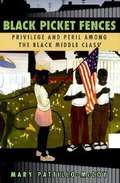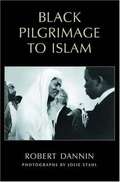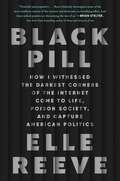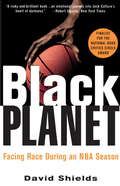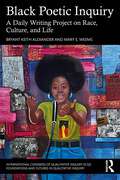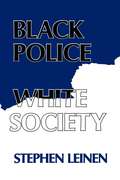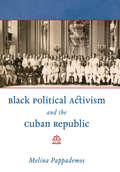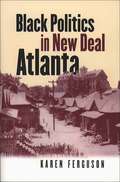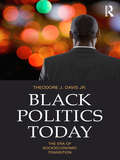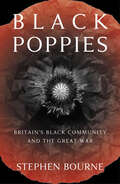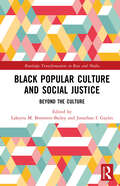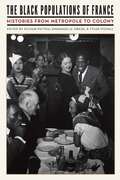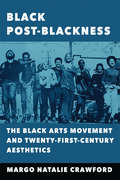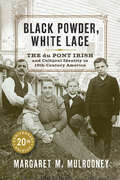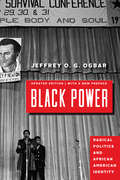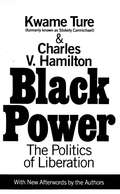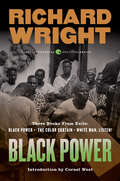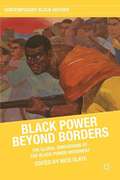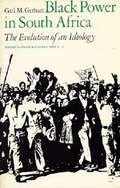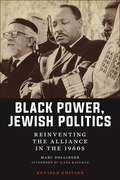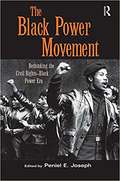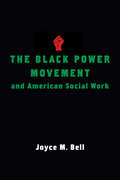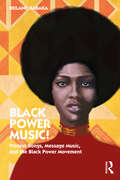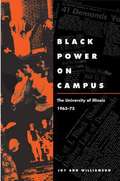- Table View
- List View
Black Picket Fences: Privilege and Peril Among the Black Middle Class
by Mary Pattillo-Mccoy"Black Picket Fences" is a stark, moving, and candid look at a section of America that is too often ignored by both scholars and the media: the black middle class. The result of living for three years in "Groveland," a black middle-class neighborhood on Chicago's South Side, sociologist Mary Pattillo-McCoy has written a book that explores both the advantages and the boundaries that exist for members of the black middle class. Despite arguments that race no longer matters, Pattillo-McCoy shows a different reality, one where black and white middle classes remain separate and unequal.
Black Pill: How I Witnessed the Darkest Corners of the Internet Come to Life, Poison Society, and Capture American Politics
by Elle ReeveThis tour de force of investigative journalism—in the vein of The Next Civil War and Why We&’re Polarized—reveals how the battle between the right and left is spilling out from the darkest corners of the internet into the real world with often tragic consequences. Award-winning journalist and CNN correspondent Elle Reeve was not surprised by the insurrection at the Capitol on January 6, 2021. With years of in-depth research and on-the-ground investigative reporting under her belt, Reeve was aware of the preoccupations of the online far right and their journey from the computer to QAnon, militias, and racist groups. At the same time, Reeve saw a parallel growth of counterforces, with citizen vigilantes using new tools and tactics to take down the far right. This ongoing battle, long fought mainly on the internet, had arrived in the real world with greater and greater frequency. With a sharp eye for detail and a dash of dark humor, Reeve explains the origins of this shocking sweep of political violence. Drawing on countless interviews with sources in the white nationalist movement as well as hundreds of as-yet-unseen documents, she takes us on a surreal journey from the darkest corners of the internet to the most significant and chilling scenes of real-world political violence in generations. A stranger-than-fiction odyssey into the dark heart of what American politics has become, Black Pill is necessary reading for any supporter of democracy.
Black Planet: Facing Race During an NBA Season
by David ShieldsThe NBA is a place where, without ever acknowledging it white fans and black players enact and quietly explode virtually every racial issue and tension in the culture at large. In "Black Planet" the author/cultural narrator David Shields lays himself open as a representative of American fandom in order to scrutinize how white people think and talk about black heroes, black scapegoats and black masculinity. As a fan among fans, as a voice among other voices, as participant and observer, David Shields places himself in the middle of a complex social ambiguity. As a white fan of a predominately black, sport, he sets out to chronicle a season of the Seattle Supersonics by immersing himself in games, radio shows, the internet, charity events and print media- to explore the ways in which the game is talked about, presented and understood by the player and the fan. Sometimes funny and sometimes painfully on target, Shields reveals a telling commentary on the culture at large through a national obsession.
Black Poetic Inquiry: A Daily Writing Project on Race, Culture, and Life (International Congress of Qualitative Inquiry (ICQI) Foundations and Futures in Qualitative Inquiry)
by Bryant Keith Alexander Mary E. WeemsThe poems in this project were written within a 24‑hour period of each other and are presented in order of their appearance for the month of January 2024.Written as a call and response to each other, the poems are at times direct responses in content and form, or a mediation on what the offering triggered in the other. Using poetry writing as a methodological engagement with the reflective and reflexive attributes of autoethnography, this project offers an examination of lived experience and will provide a critical expansion of poetic inquiry. An example of "collaborative spirit‑writing," this text uses a dialogical exchange of responsiveness, excavating the lived experiences of the two authors (a Black man and a Black woman) with complex intersectional identities. Using poetic writing as both form and function, this book provides a performance of remembrance and resistance.Students and researchers working with qualitative inquiry and in areas from performative writing to Critical Race Studies will find this book a useful addition to their research. Teachers will also find this book facilitates pedagogies of engagement.
Black Police, White Society
by Steven Leinen"Extremely informative. . . deserves a wide readership, both inside and outside police departments."-Publishers Weekly "An imaginative and insightful account of the day-to-day life of the black police officer in a large urban environment. A must read for all police officers, white as well as black."-Marvin BluePresident, Guardians AssociationNew York City Police Department ". . . well written and achieves its purpose. It will be of interest to specialists and students of race relations, urban problems, and criminal justice issues."br>-Library Journal This book is about the world of black police in New York City: who they are, how they work with the department, how they are recruited by whites, how they are treated in turn by their fellow blacks, and how they operate day by day in the richest as well as the poorest parts of the city. Leinen provides direct quotations from police, citizens, city administrators, and street hustlers, as well as detailed assessments of encounters in the everyday relations between police and the public.
Black Political Activism and the Cuban Republic
by Melina PappademosWhile it was not until 1871 that slavery in Cuba was finally abolished, African-descended people had high hopes for legal, social, and economic advancement as the republican period started. InBlack Political Activism and the Cuban Republic, Melina Pappademos analyzes the racial politics and culture of black civic and political activists during the Cuban Republic. The path to equality, Pappademos reveals, was often stymied by successive political and economic crises, patronage politics, and profound racial tensions. In the face of these issues, black political leaders and members of black social clubs developed strategies for expanding their political authority and for winning respectability and socioeconomic resources. Rather than appeal to a monolithic black Cuban identity based on the assumption of shared experience, these black activists, politicians, and public intellectuals consistently recognized the class, cultural, and ideological differences that existed within the black community, thus challenging conventional wisdom about black community formation and anachronistic ideas of racial solidarity. Pappademos illuminates the central, yet often silenced, intellectual and cultural role of black Cubans in the formation of the nation's political structures; in doing so, she shows that black activism was only partially motivated by race.
Black Politics in New Deal Atlanta
by Karen FergusonWhen Franklin Roosevelt was elected president in 1932, Atlanta had the South's largest population of college-educated African Americans. The dictates of Jim Crow meant that these men and women were almost entirely excluded from public life, but as Karen Ferguson demonstrates, Roosevelt's New Deal opened unprecedented opportunities for black Atlantans struggling to achieve full citizenship. Black reformers, often working within federal agencies as social workers and administrators, saw the inclusion of African Americans in New Deal social welfare programs as a chance to prepare black Atlantans to take their rightful place in the political and social mainstream. They also worked to build a constituency they could mobilize for civil rights, in the process facilitating a shift from elite reform to the mass mobilization that marked the postwar black freedom struggle. Although these reformers' efforts were an essential prelude to civil rights activism, Ferguson argues that they also had lasting negative repercussions, embedded as they were in the politics of respectability. By attempting to impose bourgeois behavioral standards on the black community, elite reformers stratified it into those they determined deserving to participate in federal social welfare programs and those they consigned to remain at the margins of civic life.
Black Politics Today: The Era of Socioeconomic Transition (Routledge Series on Identity Politics)
by Theodore J. Davis Jr.The late 1980s ushered in a new era of black politics, the socioeconomic transition era. Coming on the heels of the protest era and politics era, the current stage is characterized by the emergence of a new black middle class that came of age after the Civil Rights struggle. Although class still isn’t a strong factor in the external politics of the black community, it is increasingly a wedge issue in the community’s internal politics. Black politics today is increasingly less about the interest of the larger group and more about the interest of smaller subgroups within the community. Theodore J. Davis Jr. argues that the greatest threat to the social and political cohesiveness of the so-called black community may be the rise of a socially and economically privileged group among the ranks of black America. This rift has affected blacks’ ability to organize effectively and influence politics. Davis traces the changes in economic status, public opinion, political power and participation, and leadership over three generations of black politics. The result is an insightful analysis of black politics today.
Black Poppies: Britain's Black Community and the Great War
by Stephen Bourne'A powerful, revelatory counterbalance to the whitewashing of British history' - Bernardine Evaristo, Booker Prize-winning author of Girl, Woman, OtherIn this updated edition of his acclaimed study of the black presence in Britain during the First World War, Stephen Bourne illuminates fascinating stories of black servicemen of African heritage. These accounts of the fights for their 'Mother Country' are charted from the outbreak of war in 1914 to the conflict's aftermath in 1919, when black communities up and down Great Britain were faced with anti-black 'race riots' despite their dedicated services to their country at home and abroad.With unprecedented access to the wartime personal correspondence of the Jamaican siblings Vera, Norman and Douglas Manley, Bourne helps bring to light the day-to-day trials, tribulations and tragedies of life on the battlefield. The stories of servicemen like Arthur Roberts - Scotland's Black Tommy - and Trinidadian soldier and campaigner George A. Roberts sit alongside the experiences of people of African descent at home during the First World War.These include a black police officer, munitions factory workers and even stars of the stage like Cassie Walmer. Informative and accessible, with first-hand accounts and original photographs, Black Poppies is the essential guide to the military and civilian wartime experiences of black men and women, from the trenches to the music halls.
Black Popular Culture and Social Justice: Beyond the Culture (Routledge Transformations in Race and Media)
by Lakeyta M. Bonnette-Bailey Jonathan I. GaylesThis volume examines the use of Black popular culture to engage, reflect, and parse social justice, arguing that Black popular culture is more than merely entertainment. Moving beyond a focus on identifying and categorizing cultural forms, the authors examine Black popular culture to understand how it engages social justice, with attention to anti-Black racism. Black Popular Culture and Social Justice takes a systematic look at the role of music, comic books, literature, film, television, and public art in shaping attitudes and fighting oppression. Examining the ways in which artists, scholars, and activists have engaged, discussed, promoted, or supported social justice – on issues of criminal justice reform, racism, sexism, LGBTQIA rights, voting rights, and human rights – the book offers unique insights into the use of Black popular culture as an agent for change. This timely and insightful book will be of interest to students and scholars of race and media, popular culture, gender studies, sociology, political science, and social justice.
The Black Populations of France: Histories from Metropole to Colony
by Sylvain Pattieu Emmanuelle Sibeud Tyler StovallThe Black Populations of France is a study of Black peoples and their history in France and the French Empire during the modern era, from the eighteenth century to the present. The contributors to this collection explore three main axes. The first addresses circulations—the ways Black populations have moved through the spaces of metropolitan France and the empire—and focuses on the actors themselves and the margins of maneuver available to them, particularly as soldiers, sailors, immigrants, or political militants. The second considers legacies and the ways the past has informed the present, addressing themes such as the memory of slavery, the histories of Black women and gender, and the historical influence of African Americans on Blacks in France. The final axis considers racial policy and the ways the state has shaped racial discourses through the interactions between state policies and ideas of race developed by individuals, organizations, and communities. The Black Populations of France makes an important contribution to both modern French history and the history of the global Black diaspora. By putting these histories in dialogue with each other, it underscores the central place of France in world history.
Black Post-Blackness: The Black Arts Movement and Twenty-First-Century Aesthetics
by Margo Natalie CrawfordA 2008 cover of The New Yorker featured a much-discussed Black Power parody of Michelle and Barack Obama. The image put a spotlight on how easy it is to flatten the Black Power movement as we imagine new types of blackness. Margo Natalie Crawford argues that we have misread the Black Arts Movement's call for blackness. We have failed to see the movement's anticipation of the "new black" and "post-black." Black Post-Blackness compares the black avant-garde of the 1960s and 1970s Black Arts Movement with the most innovative spins of twenty-first century black aesthetics. Crawford zooms in on the 1970s second wave of the Black Arts Movement and shows the connections between this final wave of the Black Arts movement and the early years of twenty-first century black aesthetics. She uncovers the circle of black post-blackness that pivots on the power of anticipation, abstraction, mixed media, the global South, satire, public interiority, and the fantastic.
Black Powder, White Lace: The du Pont Irish and Cultural Identity in Nineteenth-Century America (Cultural Studies of Delaware and the Eastern Shore)
by Margaret M. MulrooneyTwenty years ago, Margaret Mulrooney's history of the community of Irish immigrant workers at the du Pont powder yards, Black Powder, White Lace, was published to wide acclaim. Now, as much of the materials Mulrooney used in her research are now electronically available to the public, and as debates about immigration continue to rage, a new edition of the book is being published to remind readers of the rich materials available on the du Pont workers, and of Mulrooney's powerful conclusions about immigrant communities in America. Explosives work was dangerous, but the du Ponts provided a host of benefits to their workers. As a result, the Irish remained loyal to their employers, convinced by their everyday experiences that their interests and the du Ponts' were one and the same. Employing a wide array of sources, Mulrooney turns away from the worksite and toward the domestic sphere, revealing that powder mill families asserted their distinctive ethno-religious heritage at the same time as they embraced what U.S. capitalism had to offer.
Black Power: Radical Politics and African American Identity
by Jeffrey O. OgbarExploring the profound impact of the Black Power movement on African Americans.Outstanding Academic Title, ChoiceIn the 1960s and 70s, the two most important black nationalist organizations, the Nation of Islam and the Black Panther Party, gave voice and agency to the most economically and politically isolated members of black communities outside the South. Though vilified as fringe and extremist, these movements proved to be formidable agents of influence during the civil rights era, ultimately giving birth to the Black Power movement.Drawing on deep archival research and interviews with key participants, Jeffrey O. G. Ogbar reconsiders the commingled stories of—and popular reactions to—the Nation of Islam, Black Panthers, and mainstream civil rights leaders. Ogbar finds that many African Americans embraced the seemingly contradictory political agenda of desegregation and nationalism. Indeed, black nationalism, he demonstrates, was far more favorably received among African Americans than historians have previously acknowledged. It engendered minority pride and influenced the political, cultural, and religious spheres of mainstream African American life for the decades to come.This updated edition of Ogbar's classic work contains a new preface that describes the book's genesis and links the Black Power movement to the Black Lives Matter movement. A thoroughly updated essay on sources contains a comprehensive review of Black Power–related scholarship. Ultimately, Black Power reveals a black freedom movement in which the ideals of desegregation through nonviolence and black nationalism marched side by side.
Black Power: Politics of Liberation in America
by Kwame Ture Charles HamiltonIn 1967, this revolutionary work exposed the depths of systemic racism in this country and provided a radical political framework for reform: true and lasting social change would only be accomplished through unity among African-Americans and their independence from the preexisting order. An eloquent document of the civil rights movement that remains a work of profound social relevance 25 years after it was first published.From the Trade Paperback edition.
Black Power: Three Books from Exile: Black Power; The Color Curtain; and White Man, Listen!
by Richard WrightOriginally published in 1954, Richard Wright's Black Power is an extraordinary nonfiction work by one of America's premier literary giants of the twentieth century. An impassioned chronicle of the author's trip to Africa's Gold Coast before it became the free nation of Ghana, it speaks eloquently of empowerment and possibility, and resonates loudly to this day. Also included in this omnibus edition are two nonfiction works Wright produced around the time of Black Power. White Man, Listen! is a stirring collection of his essays on race, politics, and other essential social concerns ("Deserves to be read with utmost seriousness"--New York Times). The Color Curtain is an indispensable work urging the removal of the color barrier. It remains one of the key commentaries on the question of race in the modern era. ("Truth-telling will perhaps always be unpopular and suspect, but in The Color Curtain, as in all his later nonfiction, Wright did not hesitate to tell the truth as he saw it."--Amritjit Singh, Ohio University)
Black Power beyond Borders
by Nico SlateBlack Power burst seemingly out of nowhere in 1966 - a maelstrom of racial pride, anger, and violence that threatened the civil rights movement and challenged the very fabric of American society. Or at least that's how many have come to understand the story. In truth, the historical phenomenon of Black Power is older, richer, and more global than is commonly understood. From Harlem and Oakland to India and Israel, it inspired and defined political movements that challenged boundaries throughout the world. In this truly groundbreaking volume, figures as varied as Angela Davis and Stevie Wonder are considered alongside lesser-known Black Power organizations like the Polynesian and Dalit Panthers, illuminating the transnational contours of the Black Power movement.
Black Power in South Africa: The Evolution of an Ideology
by Gail M. GerhartIt provides an understanding of the politics and ideology of orthodox African nationalism, or Black Power, in South Africa since World War II, from the Youth League of the African Student National Congress (ANC) of the late 1940s to the South African Student Organization (SASO) and the Black Consciousness Movement of the 1970s.
Black Power, Jewish Politics: Reinventing the Alliance in the 1960s, Revised Edition (Goldstein-Goren Series in American Jewish History)
by Marc DollingerHighlights Jewish participation in the civil rights movementBlack Power, Jewish Politics charts the transformation of American Jewish political culture from the Cold War liberal consensus of the early postwar years to the rise and influence of Black Power-inspired ethnic nationalism. It shows how, in a period best known for the rise of antisemitism in some parts of the Black community and the breakdown of the alliance between white Jews and Black Americans, Black Power activists enabled Jewish activists to devise a new Judeo-centered political agenda—including the emancipation of Soviet Jews, the rise of Jewish Day Schools, the revitalization of worship services with gender-inclusive liturgy, and the birth of a new form of American Zionism.Undermining widely held beliefs about the civil rights movement, Black Power, racism, Soviet Jewry, American Zionism, and the religious revival of the 1970s, Black Power, Jewish Politics describes a new political consensus based on identity politics that drew Black and Jewish Americans together and altered the course of American liberalism.In the midst of national reckoning on race, this revised edition extends the book’s thesis to the contemporary period, investigating the limits of white Jewish liberalism, the ways in which scholars have and have not addressed racial privilege in their work, and the dynamics around these themes in a much more diverse American Jewish community.
The Black Power Movement: Rethinking the Civil Rights-Black Power Era
by Peniel E. JosephThe Black Power Movement remains an enigma. Often misunderstood and ill-defined, this radical movement is now beginning to receive sustained and serious scholarly attention. Peniel Joseph has collected the freshest and most impressive list of contributors around to write original essays on the Black Power Movement. Taken together they provide a critical and much needed historical overview of the Black Power era. Offering important examples of undocumented histories of black liberation, this volume offers both powerful and poignant examples of 'Black Power Studies' scholarship.
The Black Power Movement and American Social Work
by Joyce BellThe Black Power movement has often been portrayed in history and popular culture as the quintessential "bad boy" of modern black movement-making in America. Yet this impression misses the full extent of Black Power's contributions to U.S. society, especially in regard to black professionals in social work. Relying on extensive archival research and oral history interviews, Joyce M. Bell follows two groups of black social workers in the 1960s and 1970s as they mobilized Black Power ideas, strategies, and tactics to change their national professional associations. Comparing black dissenters within the National Federation of Settlements (NFS), who fought for concessions from within their organization, and those within the National Conference on Social Welfare (NCSW), who ultimately adopted a separatist strategy, she shows how the Black Power influence was central to the creation and rise of black professional associations. She also provides a nuanced approach to studying race-based movements and offers a framework for understanding the role of social movements in shaping the non-state organizations of civil society.
The Black Power Movement and American Social Work
by Joyce M. BellThe Black Power movement has often been portrayed in history and popular culture as the quintessential "bad boy" of modern black movement making in America. Yet this image misses the full extent of Black Power's contributions to U.S. society, especially in regard to black professionals in social work.Relying on extensive archival research and oral history interviews, this study follows two groups of black social workers in the 1960s and 1970s as they mobilized Black Power ideas, strategies, and tactics to change their national professional associations. Comparing black dissenters within the National Federation of Settlements (NFS), who fought for concessions from within their organization, and those within the National Conference on Social Work (NCSW), who ultimately adopted a separatist strategy, this book shows how the Black Power influence was central to the rise of black professional associations. It provides a nuanced approach to studying race-based movements and offers a framework for understanding the role of social movements in shaping the nonstate organizations of civil society.
Black Power Music!: Protest Songs, Message Music, and the Black Power Movement
by Reiland RabakaBlack Power Music! Protest Songs, Message Music, and the Black Power Movement critically explores the soundtracks of the Black Power Movement as forms of "movement music." That is to say, much of classic Motown, soul, and funk music often mirrored and served as mouthpieces for the views and values, as well as the aspirations and frustrations, of the Black Power Movement. Black Power Music! is also about the intense interconnections between Black popular culture and Black political culture, both before and after the Black Power Movement, and the ways in which the Black Power Movement in many senses symbolizes the culmination of centuries of African American politics creatively combined with, and ingeniously conveyed through, African American music. Consequently, the term "Black Power music" can be seen as a code word for African American protest songs and message music between 1965 and 1975. "Black Power music" is a new concept that captures and conveys the fact that the majority of the messages in Black popular music between 1965 and 1975 seem to have been missed by most people who were not actively involved in, or in some significant way associated with, the Black Power Movement.
Black Power on Campus: The University of Illinois, 1965-75
by Joy Ann WilliamsonJoy Ann Williamson charts the evolution of black consciousness on predominately white American campuses during the critical period between the mid-1960s and mid-1970s, with the Black student movement at the University of Illinois at Urbana-Champaign serving as an illuminating microcosm of similar movements across the country. Drawing on student publications of the late 1960s and early 1970s, as well as interviews with student activists, former administrators, and faculty, Williamson discusses the emergence of Black Power ideology, what constituted "blackness," and notions of self-advancement versus racial solidarity.
